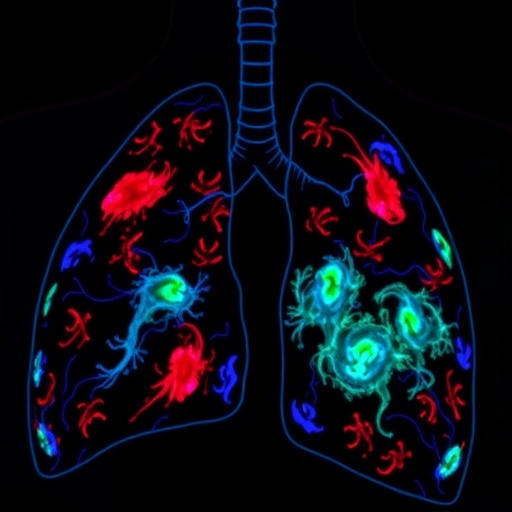In a groundbreaking study that sheds light on the intricate interplay between immune cells and cancer therapy resistance, researchers have unveiled how M2 polarization of macrophages can shield lung cancer cells from the lethal effects of cold atmospheric plasma (CAP) treatment. This discovery not only advances our understanding of tumor microenvironment dynamics but could also pave the way for more effective therapeutic strategies against lung cancer, a leading cause of cancer mortality worldwide.
Cold atmospheric plasma has emerged as a promising anti-cancer tool due to its ability to generate reactive oxygen and nitrogen species that induce oxidative stress and cell death selectively in tumor cells. However, the efficacy of CAP treatment can be markedly influenced by the surrounding cellular milieu within the tumor, particularly immune cells such as macrophages. Macrophages are highly plastic immune cells capable of adopting distinct functional phenotypes in response to environmental cues. The M2 macrophage phenotype is generally associated with immunosuppressive, tissue remodeling, and tumor-promoting properties.
The new research reveals that M2 polarized macrophages confer a protective advantage to lung cancer cells exposed to CAP by alleviating endoplasmic reticulum (ER) stress, a critical driver of CAP-induced cytotoxicity. ER stress involves the accumulation of misfolded proteins within the ER lumen, triggering a cellular response known as the unfolded protein response (UPR). While prolonged ER stress leads to apoptosis, mitigating ER stress can enhance cancer cell survival under treatment-induced stress conditions.
Through a series of meticulous in vitro and in vivo experiments, the study demonstrates that conditioned media from M2 polarized macrophages significantly reduce markers of ER stress in lung cancer cells following CAP exposure. This reduction in ER stress corresponded with decreased apoptotic cell death and enhanced cell viability, highlighting a direct protective effect imparted by the macrophages. Conversely, M1 polarized macrophages—typically pro-inflammatory and anti-tumorigenic—did not exhibit this protective effect, underscoring the specificity of the M2 phenotype in promoting cancer cell resistance to CAP.
At the molecular level, the researchers identified key signaling pathways involved in this protective mechanism. The M2 macrophages secreted factors that modulated the PERK-eIF2α-ATF4 axis, a fundamental UPR pathway regulating ER stress responses. By attenuating the activation of PERK and downstream effectors, the macrophage-conditioned media effectively dampened the pro-apoptotic signals induced by CAP. This intricate crosstalk provides new insight into how tumor-associated macrophages can subvert therapeutic pressure by rewiring stress responses within cancer cells.
Importantly, these findings have significant implications for the clinical application of CAP in oncology. Lung cancers that possess a high infiltration of M2 polarized macrophages may exhibit intrinsic resistance to CAP therapy, necessitating combination strategies that target both cancer cells and their supportive immune microenvironment. Potential therapeutic approaches could involve reprogramming macrophage polarization from the tumor-promoting M2 state to the tumor-suppressing M1 phenotype or selectively inhibiting the macrophage-derived factors responsible for mitigating ER stress.
Furthermore, this study emphasizes the nuanced role of the tumor microenvironment in shaping responses to advanced therapies like CAP. While CAP offers a physical and chemical assault on cancer cells, the surrounding stromal and immune cells can actively counteract its effects, highlighting the complexity of tumor ecosystems. Comprehensive profiling of the tumor immune landscape may thus be crucial in predicting and improving patient responses to CAP and other oxidative stress-inducing treatments.
Beyond lung cancer, these insights could be extrapolated to other malignancies where macrophage polarization plays a pivotal role in therapy resistance. The idea that modifying macrophage phenotypes could potentiate CAP efficacy opens a new frontier for immunomodulatory interventions in cancer care. Researchers advocate for further studies to delineate the full spectrum of secreted factors and downstream signaling events mediating this protective effect.
The study utilized sophisticated cellular co-culture systems, flow cytometry, immunoblotting, and gene expression analyses to corroborate their findings, providing a robust experimental framework that marries immunology with plasma medicine. Additionally, animal models confirmed the in vivo relevance, as tumors with increased M2 macrophage content displayed reduced sensitivity to CAP, validating the clinical translatability of the results.
In summary, this pioneering research highlights the vital role of M2 polarized macrophages in orchestrating lung cancer cell survival during cold atmospheric plasma therapy by mitigating ER stress. It underscores the necessity of addressing the tumor microenvironment’s influence to overcome resistance mechanisms effectively. These revelations could inspire the development of combined modalities that integrate CAP with immunomodulatory agents, potentially transforming therapeutic paradigms for lung cancer patients.
As the field of plasma oncology advances, understanding such complex cellular interactions will be paramount to harnessing the full potential of CAP and other emerging treatments. This study serves as a compelling example of how dissecting tumor-immune interactions at the molecular level can unravel hidden mechanisms of resistance and inform innovative therapeutic strategies that ultimately improve patient outcomes.
Subject of Research: The protective role of M2 polarized macrophages in lung cancer cells against cold atmospheric plasma treatment by alleviating endoplasmic reticulum stress.
Article Title: M2 polarization of macrophage protects the lung cancer cells from cold atmospheric plasma via alleviating endoplasmic reticulum stress.
Article References:
Feng, Y., Peng, S., Zhao, L. et al. M2 polarization of macrophage protects the lung cancer cells from cold atmospheric plasma via alleviating endoplasmic reticulum stress. Cell Death Discov. 11, 487 (2025). https://doi.org/10.1038/s41420-025-02775-4
Image Credits: AI Generated
DOI: https://doi.org/10.1038/s41420-025-02775-4
Tags: cancer therapy resistance mechanismscold atmospheric plasma treatmentendoplasmic reticulum stress in cancerimmune cell interactions with cancerimmunosuppressive tumor microenvironmentlung cancer mortality and treatment advancementsM2 macrophages in lung cancermacrophage polarization and functionoxidative stress in tumor cellsreactive oxygen and nitrogen species in cancer therapytherapeutic strategies against lung cancertumor microenvironment dynamics





